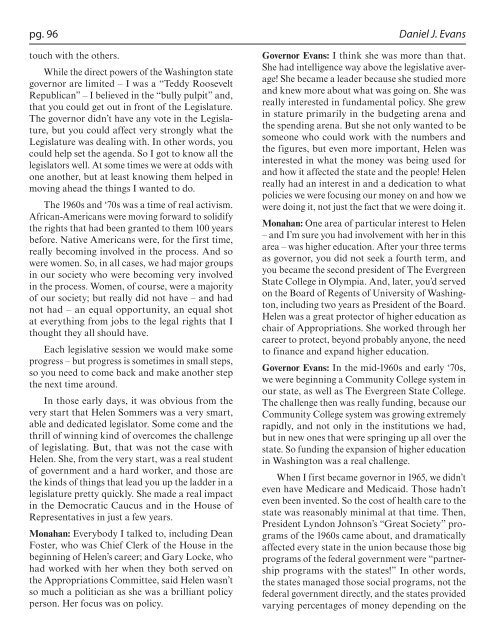Helen Sommers: An Oral History
Helen Sommers: An Oral History
Helen Sommers: An Oral History
You also want an ePaper? Increase the reach of your titles
YUMPU automatically turns print PDFs into web optimized ePapers that Google loves.
pg. 96 Daniel J. Evans<br />
touch with the others.<br />
While the direct powers of the Washington state<br />
governor are limited – I was a “Teddy Roosevelt<br />
Republican” – I believed in the “bully pulpit” and,<br />
that you could get out in front of the Legislature.<br />
The governor didn’t have any vote in the Legislature,<br />
but you could affect very strongly what the<br />
Legislature was dealing with. In other words, you<br />
could help set the agenda. So I got to know all the<br />
legislators well. At some times we were at odds with<br />
one another, but at least knowing them helped in<br />
moving ahead the things I wanted to do.<br />
The 1960s and ‘70s was a time of real activism.<br />
African-Americans were moving forward to solidify<br />
the rights that had been granted to them 100 years<br />
before. Native Americans were, for the first time,<br />
really becoming involved in the process. <strong>An</strong>d so<br />
were women. So, in all cases, we had major groups<br />
in our society who were becoming very involved<br />
in the process. Women, of course, were a majority<br />
of our society; but really did not have – and had<br />
not had – an equal opportunity, an equal shot<br />
at everything from jobs to the legal rights that I<br />
thought they all should have.<br />
Each legislative session we would make some<br />
progress – but progress is sometimes in small steps,<br />
so you need to come back and make another step<br />
the next time around.<br />
In those early days, it was obvious from the<br />
very start that <strong>Helen</strong> <strong>Sommers</strong> was a very smart,<br />
able and dedicated legislator. Some come and the<br />
thrill of winning kind of overcomes the challenge<br />
of legislating. But, that was not the case with<br />
<strong>Helen</strong>. She, from the very start, was a real student<br />
of government and a hard worker, and those are<br />
the kinds of things that lead you up the ladder in a<br />
legislature pretty quickly. She made a real impact<br />
in the Democratic Caucus and in the House of<br />
Representatives in just a few years.<br />
Monahan: Everybody I talked to, including Dean<br />
Foster, who was Chief Clerk of the House in the<br />
beginning of <strong>Helen</strong>’s career; and Gary Locke, who<br />
had worked with her when they both served on<br />
the Appropriations Committee, said <strong>Helen</strong> wasn’t<br />
so much a politician as she was a brilliant policy<br />
person. Her focus was on policy.<br />
Governor Evans: I think she was more than that.<br />
She had intelligence way above the legislative average!<br />
She became a leader because she studied more<br />
and knew more about what was going on. She was<br />
really interested in fundamental policy. She grew<br />
in stature primarily in the budgeting arena and<br />
the spending arena. But she not only wanted to be<br />
someone who could work with the numbers and<br />
the figures, but even more important, <strong>Helen</strong> was<br />
interested in what the money was being used for<br />
and how it affected the state and the people! <strong>Helen</strong><br />
really had an interest in and a dedication to what<br />
policies we were focusing our money on and how we<br />
were doing it, not just the fact that we were doing it.<br />
Monahan: One area of particular interest to <strong>Helen</strong><br />
– and I’m sure you had involvement with her in this<br />
area – was higher education. After your three terms<br />
as governor, you did not seek a fourth term, and<br />
you became the second president of The Evergreen<br />
State College in Olympia. <strong>An</strong>d, later, you’d served<br />
on the Board of Regents of University of Washington,<br />
including two years as President of the Board.<br />
<strong>Helen</strong> was a great protector of higher education as<br />
chair of Appropriations. She worked through her<br />
career to protect, beyond probably anyone, the need<br />
to finance and expand higher education.<br />
Governor Evans: In the mid-1960s and early ‘70s,<br />
we were beginning a Community College system in<br />
our state, as well as The Evergreen State College.<br />
The challenge then was really funding, because our<br />
Community College system was growing extremely<br />
rapidly, and not only in the institutions we had,<br />
but in new ones that were springing up all over the<br />
state. So funding the expansion of higher education<br />
in Washington was a real challenge.<br />
When I first became governor in 1965, we didn’t<br />
even have Medicare and Medicaid. Those hadn’t<br />
even been invented. So the cost of health care to the<br />
state was reasonably minimal at that time. Then,<br />
President Lyndon Johnson’s “Great Society” programs<br />
of the 1960s came about, and dramatically<br />
affected every state in the union because those big<br />
programs of the federal government were “partnership<br />
programs with the states!” In other words,<br />
the states managed those social programs, not the<br />
federal government directly, and the states provided<br />
varying percentages of money depending on the
















